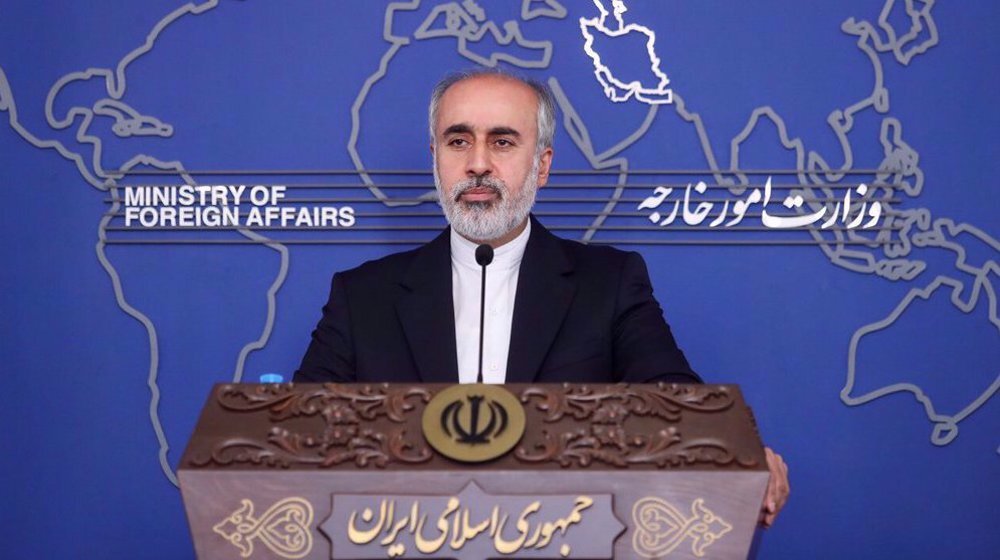Iran condemns new European sanctions, says it reserves right to respond

TEHRAN - In a strong rebuke, Iran has condemned the European Union's imposition of fresh sanctions against Iranian officials and entities, emphasizing the Islamic Republic's right to retaliate.
On Friday, the EU imposed sanctions on multiple Iranian individuals and entities, accusing them of facilitating the transfer of drones and missiles for use in the Ukraine conflict by Russia. Tehran has consistently denied any involvement in the Ukraine war and has called on Western powers and Kyiv to provide concrete evidence to support their claims.
On Friday Iran's Foreign Ministry spokesman, Nasser Kanaani, sharply criticized the EU's double standards. “The European Union, which has been passive and ineffective in dealing with the humanitarian disaster in Gaza and Palestine for the past months and has been criticized by Europe’s public opinion as well as people all over the world, once again instead of focusing on the war crimes of the Zionist regime in Gaza and punishing and banning this criminal regime, has put on its list of sanctions some leading and influential Iranian officials and institutions in the fight against terrorism and ensuring lasting security in the region,” he said.
"It is regrettable that the European Union, by resorting to repeated, absurd, and baseless excuses and accusations, ignoring the realities on the ground in West Asia, and continuing its failed and ineffective approach, once again resorted to the outdated and ineffective tool of sanctions against sovereign Iran and preferred the Zionist regime’s and the United States’ satisfaction to the interests of the European Union and nations."
Kanaani stressed Iran's commitment to regional and international peace and security adding that the country reserves the right to respond to the EU's "destructive approach."
The EU sanctions target six individuals, including Iran's Defense Minister Brigadier General Mohammad Reza Ashtiani and Major General Gholam-Ali Rashid, and three entities. The measures prohibit EU citizens and companies from conducting business with these parties.
According to Iran’s late Foreign Minister Hossein Amir Abdollahian, Tehran only delivered drones to Russia prior to the Ukraine war in February of 2022. Iran held bilateral meetings with Ukraine to clear misunderstandings, but could not continue with the talks after the West intervened, preventing Kyiv from talking directly to Tehran.
The West Asian country has a vast arsenal consisting of various sophisticated weapons. Its drones and missiles have particularly gained immense attention in the past years.
Iranian officials have repeatedly emphasized their commitment to enhancing military capabilities for defensive purposes only. They have warned that the country will not hesitate to strengthen its military to ensure its sovereignty and national security.
Condemnation of U.S.-UK strikes on Yemeni Soil
Also on Friday, the Iranian foreign ministry spokesman denounced the recent airstrikes carried out by the United States and the United Kingdom against Yemen, which resulted in the deaths and injuries of dozens of people.
Kanaani expressed Iran's condemnation, highlighting the timing of the strikes, which coincided with Western support for Israel's ongoing offensive against Palestinians in Gaza. He accused the U.S. and UK of seeking to destabilize the region and undermine Yemen's support for the Palestinian cause.
“Such attacks seek to expand insecurity across the region and prevent the Yemeni people’s honorable support for the oppressed Palestinian nation,” the spokesman noted.
Kanaani emphasized that the strikes violated international law and human rights, and called on the international community and Muslim countries to condemn the actions of Washington and London.
“The aggressive American and British governments bear responsibility for the repercussions of these atrocities against the Yemeni people,” he asserted.
Ali al-Qahoum, a member of Yemen's Ansarullah resistance movement, vowed a "painful response" to the attacks. He indicated that Yemeni missiles could target U.S. and Israeli vessels and the occupied territories.
“The Americans and Britons must have understood how powerful Yemeni strikes will be. Our ballistic missiles can target desired targets in the sea and in the occupied Palestinian territories," he told Lebanon’s al-Mayadeen television network.
In response to the airstrikes, the Yemeni Armed Forces announced that they had targeted the U.S. aircraft carrier USS Dwight D. Eisenhower in the Red Sea with winged and ballistic missiles.
“The operation was carried out with a number of winged and ballistic missiles,” the forces’ spokesman Brigadier General Yahya Saree said, noting that “the hit was accurate and direct.”
Yemen has been targeting Israeli ships or Israeli-bound ships in the Red Sea, in an attempt to pressure the regime into putting an end to its genocidal attacks on the besieged Gaza Strip. The West, instead of pulling the plug on Israel, has decided to assault Yemenis through direct attacks on their soil.
Israel’s war on Gaza which followed a successful military operation by Palestinian resistance forces on October 7, has so far killed over 36,000 civilians, mostly women and children.
Leave a Comment